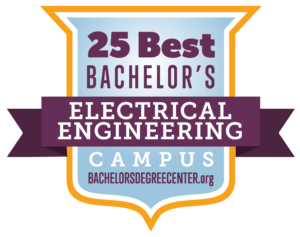
Electrical engineering is the foundation for just about all modern technology, and a bachelor’s degree in electrical engineering is the foundation of one of the most in-demand careers out there. You should get a bachelor of electrical engineering if you’re seeking a satisfying career that lets you create, build and repair things for people to use. If you ever pulled apart objects to find out how they work, you’re a good candidate to get a bachelor’s in electrical engineering.
An electrical engineer works in a diverse array of fields that include designing computer components and systems, communications equipment and systems, power systems such as power grids, robotics, and just about anything that uses electricity and electronics to function. You can tailor a bachelor’s in electrical engineering degree program to focus on the area of electrical engineering that interests you most.
Methodology: Ranking the Best Bachelor of Electrical Engineering Programs
For our ranking of the best traditional, on-campus electrical engineering bachelor’s programs, Bachelor’s Degree Center editors focused on accredited, respected colleges and universities known for their positive impact on graduates’ careers. Programs are ranked according to data from IPEDS and Niche, including cost, reputation, and salary potential.
1. Georgia Tech

Georgia Institute of Technology’s Electrical & Computer Engineering School offers a Bachelor of Science degree (BS) in Electrical Engineering that requires degree candidates to complete 132 semester units to graduate. Georgia Tech’s Bachelor of Electrical Engineering program includes coursework in electrical energy systems, digital design lab, introduction to signal processing, electro magnetics, and microelectronic circuits, plus five credits of a culminating design project. This Bachelors in Electrical Engineering degree program from Georgia Tech is a campus-based degree program that offers both a cooperative and international academic plan for degree candidates.
Georgia Tech is a multiple-campus higher learning institution that was established in the mid-1880s. Georgia Tech serves more than 36,350 students from its campuses in Atlanta, Savannah, Singapore, Ireland, and China.
What We Like: Georgia Tech maintains several campuses in Atlanta that house academic-related buildings, sports complexes, and student residents.
Degree: BS in Electrical Engineering
Georgia Institute of Technology BS in Electrical Engineering
2. Princeton University

Princeton University offers a BS in Electrical and Computer Engineering that is accredited by ABET. Princeton University’s Bachelors in Electrical Engineering degree program is campus-based and offers students ten academic concentrations that include energy & the environment, circuits, optics/photonics, data/information, biomedical engineering, computer systems, electronic devices, robotics, security/privacy, and quantum information. Classes for this Bachelor of Electrical Engineering program include contemporary logic design, solid-state devices, modern optics, and machine learning for predictive data analytics, plus independent design projects.
Princeton University is recognized to be a colonial college that was founded in 1746 and is among the oldest of all postsecondary schools in the nation. More than 8,300 students attend classes online and on the school’s Princeton, New Jersey campus.
What We Like: Princeton University holds the distinction of having the largest per-student endowment of any other school in the country.
Degree: BSE in Electrical Engineering
Princeton University BS in Electrical and Computer Engineering
3. Duke University

Pratt Engineering School at Duke University offers a BS in Engineering (BSE) with an academic major in Electrical & Computer Engineering that has received accreditation from ABET’s Engineering Commission on Accreditation. Duke University’s Bachelor of Electrical Engineering program focuses on these study areas – photonics, electromagnetic fields, Machine learning, Signal Processing, Computer Engineering, to name a few. Duke University’s Bachelors in Electrical Engineering degree program is ranked as one of the top 25 programs in the country, according to US News.
Founded as Brown School in 1838, Duke University now operates as a premier research institution of higher education. Duke remains affiliated with the United Methodist Church and operates various educations facilities and campuses in North Carolina, as well as two international locations in Singapore and China.
What We Like: Duke University is considered among the top schools in the nation as well as the most selective.
Degree: BS in Electrical and Computer Engineering
Duke University BS in Engineering
4. California Institute of Technology

California Institute of Technology’s Electrical Engineering Department offers Bachelors in Electrical Engineering degree program that is among the best campus-based programs in the Golden State. Coursework for California Institute of Technology’s Bachelor of Electrical Engineering program includes digital logic and embedded systems, analog electronics, physics of measurement, experimental robotics, advanced topics in machine learning, and electromagnetic engineering, to name a few. Students enrolled in the California Institute of Technology’s undergraduate degree in electrical engineering have the option of declaring a double major, with approval by the department faculty.
California Institute of Technology (CIT) is a sun-grant university that was established in the early 1890s. California Institute of Technology serves more than 2,150 students each year and is known for its academic and research strength in the areas of engineering and science.
What We Like: First-year students at the California Institute of Technology must live on the school’s campus, which is located about 10 miles from downtown Los Angeles.
Degree: Electrical Engineering
California Institute of Technology Electrical Engineering
5. University of Pennsylvania

The University of Pennsylvania’s Engineering School offers a Bachelor of Science in Engineering (BSE) with an academic specialty in Electrical Engineering that prepares students to develop cutting-edge technologies with the use of electricity. This campus-based offers Bachelors in Electrical Engineering degree program from the University of Pennsylvania offers students the opportunity to double major with programs in business, nursing, or engineering, among others. Additionally, Penn’s Bachelor of Electrical Engineering program encourages students to participate in a variety of international opportunities through study programs and internships.
The University of Pennsylvania was established in the 1740s and is among the nation’s oldest higher learning institutions. Founded by Benjamin Franklin, Penn now serves more than 22,150 students and is home to the oldest business school in the country – Wharton School of Business.
What We Like: The University of Pennsylvania holds the distinction of being home to the oldest student union on any campus in the United States.
Degree: BSE in Electrical Engineering
University of Pennsylvania BSE in Electrical Engineering
6. Colorado School of Mines

The Colorado School of Mines offers a BS in Electrical Engineering that offers degree candidates four academic emphases – Energy Systems, Information Systems, integrated Circuits/Electronics, and Antenna/Wireless Communications. The Colorado School of Mines’ Bachelor of Electrical Engineering program is offered on the school’s Golden, Colorado campus. Additionally, students enrolled in this Bachelor’s in Electrical Engineering degree program may choose to earn a combined BS and MS Electrical Engineering degree that allows students to shave time off both degree requirements.
The Colorado School of Mines was established as a research higher learning institution in the mid-1870s. The Colorado School of Mines focuses its academic efforts in the areas of math, engineering, and science and how it relates to the environment and energy issues.
What We Like: The school’s campus is home to the National Earthquake Info Center and serves approximately 6,550 students annually.
Degree: BS in Electrical Engineering
Colorado School of Mines BS in Electrical Engineering
7. UCLA

UCLA’s Samueli Engineering & Applied Science School offers a Bachelor of Science degree (BS) in Electrical Engineering that has been accredited by ABET’s Engineering Commission on Accreditation. UCLA’s Bachelor of Electrical Engineering program is available on the school’s iconic campus and requires the completion of 182 quarter credits to graduate. This Bachelor’s in Electrical Engineering degree program from UCLA offers a variety of academic concentrations that include bioengineering, cyber-physical systems, or computer engineering.
Established as a southern branch of the University of California, UCLA now operates as a space-grant and land-grant school with a student enrollment the nears 45,800 students. The University of California (Los Angeles) is recognized to be one of the nation’s public ivy schools.
What We Like: UCLA, for entrance into the 2021 fall semester, received more than 165,000 applications.
Degree: BS in Electrical Engineering
UCLA BS in Electrical Engineering
8. Lehigh University

Lehigh University’s Rossin Engineering & Applied Science School offers a Bachelor of Science (BS) degree program in Electrical Engineering that is available on the university’s Bethlehem campus. Lehigh University’s Bachelor of Electrical Engineering program has received accreditation from ABET’s Electrical Engineering Commission. Classes for Lehigh University’s Bachelors in Electrical Engineering program include signals and systems, electronic circuits, semiconductor devices, microcontroller lab, control, theory, memory systems, and wireless circuits, computer architecture, and introduction to electromagnetic waves, to a name a few.
Lehigh University is a research space-grant school that was established in 1865. The university’s campus is about an hour from Philadelphia and about 1.5 hours from the Big Apple. Nearly 7,000 students attend classes on the school’s 2,000+ campus and online.
What We Like: Lehigh University has a long-standing rivalry in both academics and sports with Lafayette College, located in Easton, Pennsylvania.
Degree: BS in Electrical Engineering
Lehigh University BS in Electrical Engineering
9. University of Virginia

The University of Virginia’s Brown Electrical and Computer Engineering School offers a Bachelor of Science degree (BS) in Electrical Engineering (EE) that requires degree candidates to complete 128 semester units. The University of Virginia’s Bachelors in Electrical Engineering program is a campus-based degree program that offers students several academic areas of interest in microelectronics, communication systems, electro-physics, digital system design, or control systems. This Bachelor of Electrical Engineering program from the University of Virginia includes ECE fundamentals, embedded computer systems, electromagnetic fields, and digital logic design, to name a few.
The University of Virginia (U.Va.) was founded in 1819 by Thomas Jefferson and is now a comprehensive research school that serves more than 24,950 students vying for academic degrees offered by the university’s eleven undergraduate and graduate degrees.
What We Like: The University of Virginia’s athletes have won several national championships in women swimming/diving, men’s lacrosse, and men’s basketball, among others.
Degree: BS in Electrical Engineering
University of Virginia BS in Electrical Engineering
10. University of California, Berkeley

The University of California, Berkeley offers a BS in Electrical and Computer Engineering that requires degree candidates to complete a minimum of 120 semester credits. The University of California’s Bachelors in Electrical Engineering program is campus-based. The coursework for this Bachelor of Electrical Engineering degree program includes designing information devices & systems, computer architecture, multivariable calculus, ethical implications of technology, physics for scientists and engineers, and data structures & programming, to name a few.
The University of California, Berkeley is a land grant institution of higher education that was founded in 1868. UC Berkeley is home to several national research institutes as well as affiliations with national labs nearby. The school’s student enrollment is approximately 43,150 students studying online and on-campus.
What We Like: Athletes representing the United States have won more than 115 Olympic gold medals.
Degree: BS in Electrical and Computer Engineering
University of California, Berkeley BS in Electrical and Computer Engineering
11. University of Illinois

The Grainger Computer and Electrical Engineering College University of Illinois offers a BS in Electrical Engineering that is considered world-class education. This campus-based Bachelor of Electrical Engineering degree program from UI is offered through Grainger, which has more than 300 active patents. Classes for the University of Illinois’s Bachelors in Electrical Engineering program include microelectronics/photonics, introduction to electronics, analog signal processing, fields and waves, circuits, control systems, bioimaging, signal processing, electromagnetics, and optics, to name a few.
The University of Illinois (U of I) was established under the Morrill Act in the late 1860s. Additionally, this land-grant school is also a space and sea-grant institution of higher education with a student enrollment of about 52,150 students.
What We Like: U of I’s campus covers more than 6,000 acres and has an annual budget for operations that exceeds $2 billion.
Degree: BS in Electrical Engineering
University of Illinois BS in Electrical Engineering
12. University of Michigan

The University of Michigan offers a BS in Electrical Engineering (EE) that is ranked among the top 10 programs in the nation, according to US News. The University of Michigan’s Bachelors in Electrical Engineering program offers degree candidates a variety of application areas – next0gen electronics/computing, sensing for health/safety, robotics, automotive industry, communications, or power, energy, and sustainability. Coursework for the University of Michigan’s campus-based Bachelor of Electrical Engineering degree program includes electrical engineering systems design, probabilistic methods in engineering, electromagnetics, signals & systems, and electrical engineering systems design, to name a few.
The University of Michigan (UM) is the state’s oldest university, having been established in 1817. This flagship school is also a sea and space-grant institution of higher education with a student enrollment near 46,100 students.
What We Like: The University of Michigan was established two decades before Michigan achieved statehood.
Degree: BS in Electrical Engineering
University of Michigan BS in Electrical Engineering
13. Virginia Tech

Virginia Polytechnic Institute’s Engineering College offers a campus-based Bachelor of Science degree (BS) in Electrical Engineering that is ranked nationally for the past decade and one-half. This Bachelor of Electrical Engineering degree program from Virginia Tech is accredited by the ABET Engineering Accreditation Commission. VT’s Bachelors in Electrical Engineering program enrolls about 400 students each year. Additionally, Virginia Tech’s baccalaureate degree in electrical engineering offers students undergraduate research opportunities, as well as study abroad options.
Established as a land-grant school in the early 1870s, Virginia Tech (VT) now operates as a senior military research college and a sea and space-grant school. Virginia Tech’s college-town campus covers more than 2,500 acres and serves about 36,150 students.
What We Like: In terms of enrollment, Virginia Tech is the Commonwealth of Virginia’s 2nd largest public institution of higher education.
Degree: BS in Electrical Engineering
Virginia Polytechnic Institute BS in Electrical Engineering
14. Texas A&M University

Texas A&M University offers a BS in Electrical Engineering (EE) that consistently is recognized among the top twenty public baccalaureate degrees in the country. Texas A&M University’s campus-based Bachelors in Electrical Engineering program includes classes like experimental physics and engineering lab, chemistry for engineering students, engineering mathematics, to name a few. Additionally, this Bachelor of Electrical Engineering degree program offers several academic focuses that include industrial distribution, multidisciplinary engineering, systems engineering, materials science, or mechanical engineering.
Texas A&M University (TAMU) was established in the early 1870s as a land-grant mechanical & agricultural college. With a student enrollment of 69,250, Texas A&M University is recognized to be the second-largest school in the nation.
What We Like: Texas A&M University’s campus covers more than 5,150 acres, which makes it among the largest of any university across the nation.
Degree: BS in Electrical Engineering
Texas A&M University BS in Electrical Engineering
15. Carnegie Mellon University

The Engineering College at Carnegie Mellon University offers a BS in Electrical and Computer Engineering (ECE) that is available on the Pittsburgh campus. The electrical and computing engineering core requirements for Carnegie Mellon’s Bachelors in Electrical Engineering program offer five study areas – signals and systems, device sciences, software systems, hardware systems, and circuits. Core coursework for Carnegie Mellon University’s Bachelor of Electrical Engineering degree program includes structure & design of digital systems, intro to electrical & computer engineering, and signals & systems, among others.
Established as a technical school in 1900, Carnegie Mellon University (CMU) now operates a private research school with nearly 15,000 students. Carnegie Mellon University maintains academic facilities on six continents, with the main campus located a few miles from Pittsburgh’s downtown.
What We Like: Students enrolled in Carnegie Mellon University represent more than 100 countries.
Degree: BS in Electrical and Computer Engineering
Carnegie Mellon University BS in Electrical and Computer Engineering
16. University of Florida

The Wertheim Engineering College at the University of Florida offers a campus-based BS in Electrical Engineering that requires degree candidates to complete 128 semester credits to graduate. The University of Florida’s Bachelor of Electrical Engineering degree program offers students three academic specializations that include electromagnetics, power & photonics, computers, communications & systems/controls, or electronic devices & circuits. Classes for this Bachelors in Electrical Engineering degree program include engineering design & society, introduction to electrical engineering, digital logic and computer systems, and physics of electrical engineering, among others.
The University of Florida (UF) was founded in the mid-1850s as a land-grant school. Additionally, the University of Florida (UF is a member of the state’s university system and a sea- and space-grant institution of higher education. More than 55,560 students attend classes online and on the school’s campus.
What We Like: The University of Florida is recognized to be among the top ten public schools in the country.
Degree: BS in Electrical Engineering
University of Florida BS in Electrical Engineering
17. University of Texas at Austin

The Cockrell Engineering School, located at the University of Texas at Austin, offers a BS in Electrical Engineering that has been ranked among the top ten baccalaureate programs in the nation in the US News. The University of Texas at Austin’s campus-based Bachelor of Electrical Engineering degree program offers degree candidates the opportunity to study abroad during the sessions over the summer term. UT Austin’s this Bachelor’s in Electrical Engineering degree program has been accredited by the Electrical Engineering Commission of ABET.
The University of Texas (Texas) is a flagship school that was established in the early 1880s. Additionally, the University of Texas at Austin is a space-grant school that serves more than 50,840 students and is a member of the state’s university system.
What We Like: The University of Texas is home to 17 libraries include the presidential library dedicated to Lyndon Baines Johnson.
Degree: BS in Electrical Engineering
University of Texas at Austin BS in Electrical Engineering
18. Michigan Technological University

Michigan Technological University offers a BS in Electrical Engineering degree program that is available on the school’s Houghton campus. MTU’s Bachelors in Electrical Engineering degree program offers degree candidates various academic emphases that include photonics, enterprise (business & leadership), biomedical applications, environmental applications, and electric power engineering. Graduates of Michigan Technological University’s Bachelor of Electrical Engineering degree program find rewarding careers in the areas of robotics, control systems, hybrid-vehicle power, or renewable energy solutions, among others.
Michigan Technological University (Michigan Tech) is a space-grant school that was established in the mid-1880s. More than 7,150 students attend classes on the school’s 900+ acre campus and online.
What We Like: Michigan Technological University holds the distinction of being the oldest higher learning institution that was located on the upper peninsula of the state.
Degree: BS in Electrical Engineering
Michigan Technological University BS in Electrical Engineering
19. University of California, San Diego

The University of California, San Diego offers two of California’s best bachelor’s in electrical engineering degree programs with its Bachelor of Arts or Bachelor of Science degrees in Electrical Engineering and Society that is available on the school’s sunny San Diego campus. The University of California’s Bachelor of Electrical Engineering degree program is ABET-accredited that requires the completion of 140 semester units to graduate. Coursework for this baccalaureate degree in electrical engineering includes various depth sequences in communication systems, computer system design electronic devices, photonics, power engineering, machine learning, electronic circuits, and signal/image processing.
The University of California (UCSD) is a land-grant school that was founded in 1960. The University of California in San Diego serves more than 40,250 students and is recognized to be one of the finest higher learning institutions in the world. Additionally, UC San Diego is a sea and space-grant school.
What We Like: The University of California’s San Diego campus is recognized among the country’s public ivy schools.
Degree: BS in Electrical Engineering or BA in Electrical Engineering and Society
20. University of Minnesota

The Science & Engineering College at the University of Minnesota offers a BS in Electrical Engineering degree program (EE) that prepares students for careers in acoustic testing, magnetic recording machine design, computer modeling, and embedded systems, to name a few. The University of Minnesota’s Bachelor of Electrical Engineering degree program is a campus-based program that offers these academic emphases – magnetics, optics/photonics, biomedical, signal processing, and control systems microelectronic devices.
The University of Minnesota (Minnesota) was founded as a land-grant school and now operates as the state’s flagship university. Nearly 50,000 students attend classes online and on the school’s Twin Cities campus.
What We Like: The University of Minnesota is considered to be among the nation’s Public Ivy schools and is also a space grant institution of higher education.
Degree: BS in Electrical Engineering
University of Minnesota BS in Electrical Engineering
21. University of Maryland

The University of Maryland’s Clark Engineering School offers a BS in Electrical Engineering that requires students to complete 120 semester units. This campus-based Bachelor’s in Electrical Engineering degree program from UM offers electives in the sub-disciplines of signal processing, computers, communications, power systems, electro physics, and microelectronics. Classes for this Bachelor of Electrical Engineering degree program include introduction to engineering design, discrete signal analysis, digital circuits & systems lab, and electromagnetic wave propagation, to name a few.
The University of Maryland (UM) was established as an agricultural land-grant institution of higher education in 1856. The University of Maryland’s campus in College Park covers more than 1,200 acres and serves approximately 41,050 students.
What We Like: The University of Maryland’s women’s and men’s lacrosse programs have won multiple national championships.
Degree: BS in Electrical Engineering
University of Maryland BS in Electrical Engineering
22. Rutgers University

Rutgers University’s Engineering School offers a BS in Electrical Engineering from the number one ranked public institution of higher education in the Garden State. Rutgers’ campus-based Bachelors in Electrical Engineering degree program includes classes in methods of inquiry for engineers, engineering exploration, and introduction computers for engineers, among others. This Bachelor of Electrical Engineering degree program from Rutgers University has received accreditation from the Electrical Engineering Commission of ABET.
Rutgers University is the oldest and flagship university for the State of New Jersey. The school’s student enrollment exceeds 50,000 across three campuses (New Brunswick, Newark & Camden) and online. This sea, land, and space-grant school is home to nearly 39,000 students.
What We Like: Rutgers University was originally known as Queens College and is among the oldest higher learning institutions in the nation.
Degree: BS in Electrical and Computer Engineering
Rutgers University BS in Electrical Engineering
23. University of California, Davis

The University of California, Davis’s Engineering College offers a BS in Electrical Engineering degree program that offers several academic concentrations that include communication/signal processing, analog, physical electronics, digital electronics, and electromagnetics/wireless/microwaves. UC Davis’s Bachelor of Electrical Engineering degree program is recognized as qualification enough to register as a professional engineer in each of fifty states. This undergraduate degree in electrical engineering offers students the opportunity to complete a dual concurrent major.
The University of California (Cal Davis) is recognized as a public ivy that was established in 1905. Additionally, the Davis campus of UC is home to nearly 40,000 undergraduate and graduate students and a 100-acre arboretum with more than three miles of pathways and 3,900 specimens.
What We Like: The University of California in Davis is organized into four colleges/schools in the areas of agriculture/environment sciences, letters & sciences, biological sciences, and engineering.
Degree: BS in Electrical Engineering
University of California, Davis BS in Electrical Engineering
24. University of Delaware

The University of Delaware’s Engineering College (UD) offers a BS of Electrical Engineering degree program that offers a variety of concentrations in sustainable energy, bioelectrical engineering, cybersecurity, materials/devices, circuit/system design, communications, nanofabrication, and multimedia signal processing. The University of Delaware’s Bachelors in Electrical Engineering degree program prepares graduates for rewarding careers in robotics, additive manufacturing, signals, cybersecurity, hardware communications, systems design, medical instrumentation, and nanofabrication, to name a few.
The University of Delaware (Delaware) was established in 1833 as a land-grant postsecondary school. Additionally, the University of Delaware operates as a space and sea-grant university that serves 24,060 students. The University of Delaware is only one of four schools in the nation to offer a program in art conservation.
What We Like: The University of Delaware holds the distinction of being the first higher learning institution to have offered its enrolled students a study abroad opportunity.
Degree: BS in Electrical Engineering
University of Delaware BS of Electrical Engineering
25. Ohio State University

Ohio State University offers a BS in Electrical and Computer Engineering (BSECE) that is available on the university’s Columbus campus. Ohio State University’s Bachelor of Electrical Engineering degree is ABET-accredited and ranked among the top 25 engineering programs in the nation by US News. OSU’s Bachelors in Electrical Engineering program requires degree candidates to complete at least 128 semester units. Additionally, students may opt for a dual combined baccalaureate and graduate-level degree simultaneously.
Ohio State University (OSU) is a space, sea, and land-grant postsecondary school that was established in 1879 under the Morrill Act of 1862. Additionally, OSU maintains numerous campuses (with the main campus in Columbus that covers more than 1,500 acres) that serve more than 61,250 students.
What We Like: Ohio State University is recognized to be among the top public institutions of higher education in the nation.
Degree: BS in Electrical and Computer Engineering
Ohio State University BS in Electrical and Computer Engineering
Why Should I Get a Bachelor’s in Electrical Engineering?
In the event you’re not sure what area of electrical engineering you’d like to work in, you don’t have to decide right away. Electrical engineering degree programs don’t require you to choose a concentration until you’ve reached your junior and senior years. Students who want to further explore the field of electrical engineering will want to look into a bachelor’s in electrical engineering program that offers a general course of study. A student who wants to refine their knowledge in a certain area of electrical engineering can take a post-graduate certificate program in electrical engineering that concentrates on a specific area in the field. In the event the student wants to position themselves as an expert in their chosen electrical engineering track, they can enroll in master’s of electrical engineering program.
There is no such thing as too much education when it comes to the field of electrical engineering. Someone who graduates with a bachelor’s of engineering is someone who’s starting out on a highly satisfying and well-compensated career. Many people who have a bachelor’s in electrical engineering will go far in the field due to the wide range of industries that need qualified electrical engineers. Taking the time to add to one’s education typically results in better earnings potential and more employment opportunity. It’s hard to go wrong with earning a bachelor of electrical engineering.
Why is ABET Accreditation Important?
ABET, or Accreditation Board for Engineering and Technology, is an accreditation program for schools with engineering degrees. The ABET accreditation is so important that the Principles and Practice of Engineering exam (PE) and state licensing exams are built around the standards required by ABET. Accreditation ensures that students are taught to existing and accepted standards of electrical engineering, and that they can create designs that are safe, work, and won’t endanger the end user. Engineering schools that don’t have an ABET-accredited electrical engineering program are putting their students at a disadvantage when it comes to their employment and licensing prospects.
Graduates of an electrical engineering program with an ABET accreditation first take the NCEES FE (fundamentals of engineering) exam in order to earn their initial engineering license in their state and find employment. They then have to work for at least four years in an electrical engineering firm before taking the PE for full licensure. Once they’ve passed their PE, they can then work as a Professional Engineer. Students who graduate from a school without ABET accreditation have to work for up to eight years before they can take the exam. It is also much more difficult to find employment as an electrical engineer if the student didn’t attend a school with ABET accreditation.
The importance of the ABET accreditation cannot be understated when it comes to a student’s future prospects. Make sure that the schools that are being considered have ABET accreditation prior to sending in an application. Don’t put your employment and licensing at risk by attending a school without the proper accreditation.
How Much Can I Make with an Electrical Engineering Degree?
According to the U.S. Bureau of Labor Statistics, the average electrical engineering degree salary is $103,390 per year, or $49.71 per hour. An electrical engineer that’s just graduated will earn a lower salary, but will find that their electrical engineer degree salary quickly increases as they gain experience in their chosen field. The ever-increasing reliance on electronics in daily life means an electrical engineer with a bachelor’s degree is almost guaranteed to earn a large salary over their lifetime. The field of electrical engineering is also one that isn’t strictly limited to living in or near an urban environment to earn a higher electrical engineering degree salary.
Electrical engineering jobs can be done remotely which offers the opportunity to live in locations that have a lower cost of living. And not all employers are located in large urban centers. Earning a degree in electrical engineering offers the graduate plenty of opportunity to earn a comfortable living, reside in an area that’s got a reasonable cost of living, and the ability to be a general electrical engineer to broaden the employment options. Alternatively, someone who holds a bachelor’s degree in electrical engineering can return to school for a master’s degree in electrical engineering and further refine their knowledge in a specific area of the field.
Related Rankings:
15 Best Online Bachelor’s in Electrical Engineering
10 Fastest Online Bachelor’s in Electrical Engineering
10 Most Affordable Bachelor’s in Electrical Engineering
